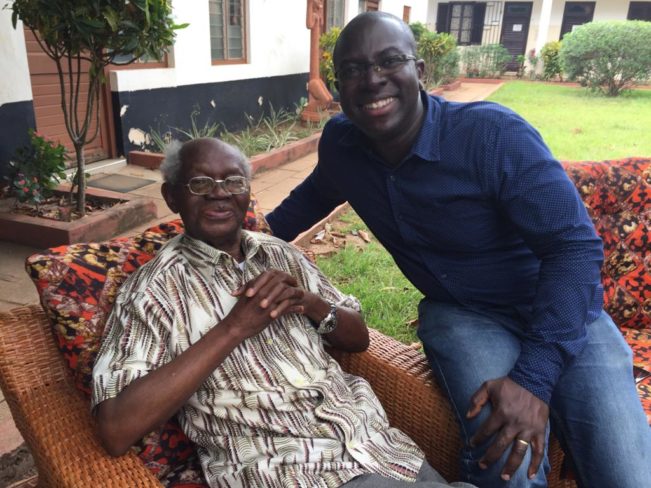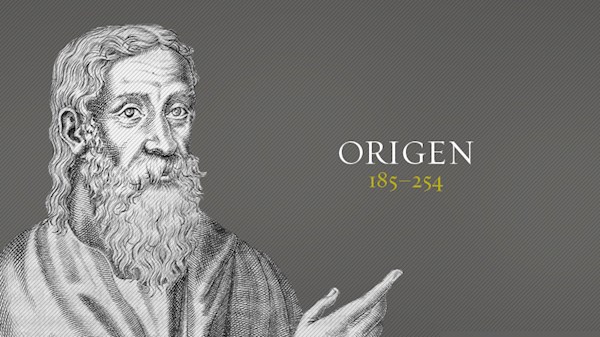Why Being an ‘African Christian’ isn’t an Oxymoron.
A friend and old school mate asked an ‘innocent question’ on Face Book: “Why is African Traditional Religion confused with wizardry or witchcraft?” Some of the responses I saw got my missiological juices going!

Hanging out with my late grandfather, Emeritus Prof. J.H. Kwabena Nketia, at the African Studies department garden at the University of Ghana
My grandfather, who was so well-eulogized in The New York Times when he passed away last year (March 2019), was so African that some people wondered how on earth he could be Christian! Even I used to wonder, with his close proximity to traditional folklore and hunter songs, familiarity with traditional palace protocols, committed transcription of Akan drum language and such. It was hard for me to decouple African traditions from ancestral and demonic worship. Being born and bred Evangelical, in my conversations with him I tried to figure out whether he actually had a personal relationship with Jesus Christ. Was he truly born again?
In the last couple of years as I’ve taken courses at the Akrofi-Christaller Institute for Theology Mission & Culture I have come to appreciate his way of being African and Christian, which the current rector of the institute, during his Evening of Remembrance sermon (see pg. 39) at the Great Hall of the University of Ghana, said that Grandpa epitomized. In fact, Prof. B.Y. Quarshie entitled his sermonette from Galatians 3:1-9 as “Fully African, Fully Christian.” After all, Prof. Nketia was the founding chancellor of Akrofi-Christaller, an accredited postgraduate degree-awarding institution, and continued for a decade, till he was about 95 years old. In his scholarly work in ethnomusicology I did not realize Grandpa was directly touching on missiology, documenting the different sights and sounds of the very “great multitude that no one could count, from every nation, tribe, people and language” that John the Revelator had a vision of, “standing before the throne and before the Lamb” (Revelation 7:9). “The music of Africa, like its language, is, so to speak, ‘ethnic-bound.’ Each society practices its own variant,” Grandpa said. Alas, this African Christian was doing holy work! As one colleague put it, and reported in The New York Times, “He showed that the African history of music was a sacred tradition revealed.”
1. THE GOSPEL CHALLENGES EVERY CULTURE
So back to Eliza’s question: “Why is African Traditional Religion confused with wizardry or witchcraft?” Good question! My first instinctive answer was, “There’s a thin line; that may be why.” Every culture has what is great about it (there are features/fingerprints of God all over) but also what is broken since Eden. Idolatry is one consequence of that brokenness, whether African, Mesopotamian or European culture. It’s actually hard to beat the many gods the Greeks and Romans (Europeans, remember?) had. Paul speaks to this issue not in an idol-ridden African village but at the Areopagus, in the heart of Greece as he gives his ‘TED Talk’:
So Paul, standing before the council, addressed them as follows: “Men of Athens, I notice that you are very religious in every way, for as I was walking along I saw your many shrines. And one of your altars had this inscription on it: ‘To an Unknown God.’ This God, whom you worship without knowing, is the one I’m telling you about. He is the God who made the world and everything in it. Since he is Lord of heaven and earth, he doesn’t live in man-made temples, and human hands can’t serve his needs—for he has no needs. He himself gives life and breath to everything, and he satisfies every need. From one man he created all the nations throughout the whole earth. He decided beforehand when they should rise and fall, and he determined their boundaries. His purpose was for the nations to seek after God and perhaps feel their way toward him and find him—though he is not far from any one of us. For in him we live and move and exist. As some of your own poets have said, ‘We are his offspring.’ And since this is true, we shouldn’t think of God as an idol designed by craftsmen from gold or silver or stone. God overlooked people’s ignorance about these things in earlier times, but now he commands everyone everywhere to repent of their sins and turn to him. For he has set a day for judging the world with justice by the man he has appointed, and he proved to everyone who this is by raising him from the dead” (Acts 17:22-31, NLT, emphasis mine).
The past is forgiven. God is now calling and commanding “everyone everywhere” to have a change of mind (repent) and turn towards him (convert)! All peoples, everywhere! Africans aren’t the only ones who have been called to turn away from idols to the one true God. All have sinned and fall short of the glory of God (Romans 3:23); all are in need of redemption. “All” means all including all, excluding none.
2. THE GOSPEL CHANGES EVERY CULTURE (BUT IS ALSO SHAPED BY IT)
As a missiologist, I was surprised how in the said Face Book discussion little credence was being given to the fact that the Gospel of Jesus Christ is for every nation, people group (ethnos), tribe and tongue. Do people just not know that or do they intentionally suppress that truth?
So while the Gospel challenges and changes every culture it is also remarkably shaped by every culture! Kenyan theologian John S. Mbiti said it best: “Christianity is always a beggar seeking food and drink, cover and shelter from the cultures and times it encounters in its never-ending journeys and wonderings.” True, some Westerners knowingly or ignorantly tried to Westernize (ostensibly ‘civilize’) our African peoples and that’s a shame (a very human thing to do—to believe what we have is best and others must conform) just as some early Christians wanted to make Jews out of Gentiles (by making circumcision a necessity) before they could be accepted into Christ.
It is a real shame that Christianity and Colonialism came from the same vessel. This generation’s got to separate the grain from the chaff. If you are an African Christian you’ve got to decolonize your faith in Jesus Christ. ‘African Christian’ is not an oxymoron. On the contrary it is the ultimate fulfilment of everything African. My Christianity must make me more African, not less, otherwise I’ve missed something really basic about the Gospel.
As a fellow Achimotan, I mentioned to Eliza she had to marvel at how the founders expertly maneuvered the tension between what’s good in our African cultures and needed to be upheld and what has to be discarded (including witchcraft) because of God’s revelation in Christ. They therefore wanted an institution whose ideals were “the belief on which all else rest, in Jesus Christ as the revelation of all time and all people, of the love of God, and as the guide and pattern for our lives” and simultaneously one where there was “respect for all that is true and lasting value in the old African culture, beliefs and ways of life.”

An example of an African Christian who shaped European (and global) Christianity before the advent of European missions to Africa and colonialism a millennium-and-a-half later
3. DECOLONIZING THE GOSPEL STORY
Every African Christian must own a copy of and read Oden’s ‘How Africa Shaped the Christian Mind.’ Early African Christians (as early as the 30s and 40s A.D.) and later on into the second to fifth centuries literally shaped Western Christianity before the latter turned round 1,500 years later to bring us a Gospel that was in Western garbs and made to look as if Jesus was ‘Made in the West.’ Know your history so that no one robs you of your salvation in Jesus Christ, which is for all people–every nation, tribe and tongue.
Even newer than Oden’s work is Bantu’s “A Multitude of All Peoples: Engaging Ancient Christianity’s Global Identity” (2020). In it he asserts how “Christianity is not becoming a global religion. It has always been a global religion. The early Christian movement spread from Jerusalem in every direction, taking on local cultural expression all around the ancient world.” And asks, “So why do so many people see Christianity as a primarily Western, white religion?”
When people, out of arrogance or ignorance, tell Africans like me that “Christianity is the white man’s religion”, I laugh on many levels: anthropological, historical, missiological, scriptural, theological… I wish I had the time to chase all those assertions and their originators. The fact that I do not always respond should not be misconstrued as I have no cogent answers.
Even without going into the MANY Scriptural references to Africa(ns), I can think of African Christians in the last 2,000 years who have shaped Christianity like Athenesius, Anthony of Egypt, St. Augustine (from Algeria), Justin, Clement, Origen (picture above) etc. In fact, even the term ‘Trinity’ was coined by an African called as Tertullian (from Tunisia). He is the same guy who gave us the designations of Old and New testaments.
Origen, for example, “was incomparably the greatest scholar and theologian of the Eastern Church in the early centuries as well as a prolific writer. His learning and his works were encyclopaedic. He is reputed to have written about 6,000 books. The first scientific theologian, Origen was a man ahead of his age, particularly in terms of Biblical scholarship and criticism” (Dictionary of African Christian Biography). Make the time to visit the Dictionary of African Christian Biography, and be inspired by the stories of ancients through martyrs and missionaries to nationalists. ALL AFRICAN.
TIME TO COOL OFF WITH A SIP OF GLORIOUS PALM WINE
I like how intelligent contemporary Africans are asking intelligent questions about culture and faith. May it go with an attendant desire to learn proper history and with discernment to extract the pure Gospel from its various cultural entrapments. The Gospel of Jesus Christ is good news for ALL people–EVERY nation, tribe and tongue!

